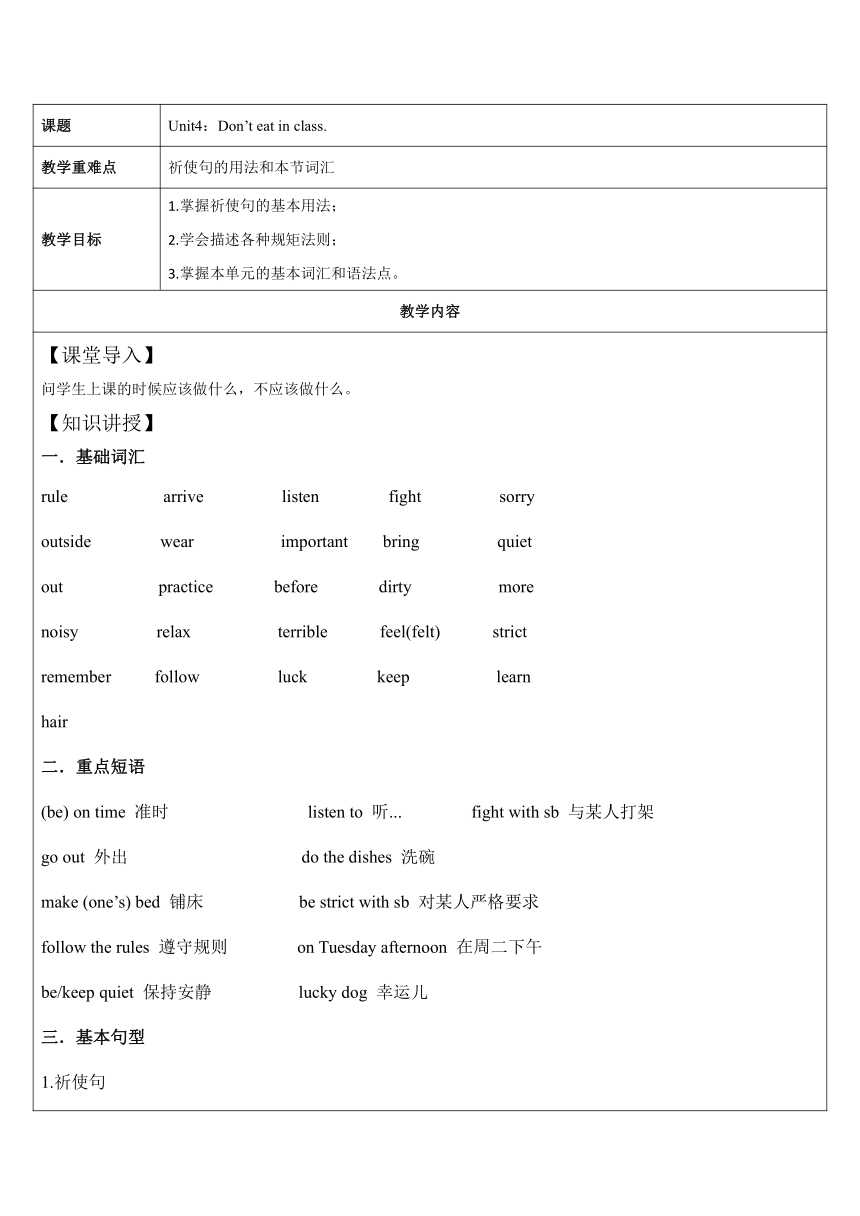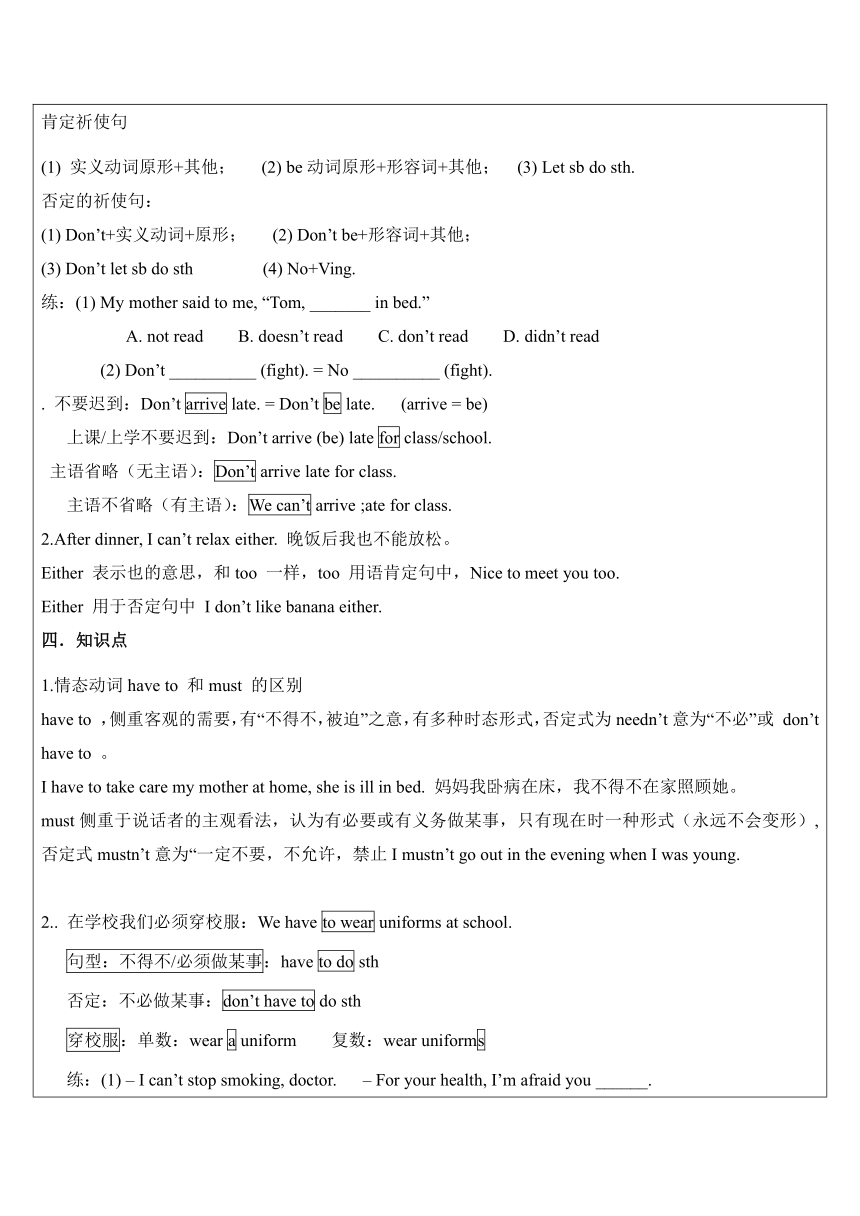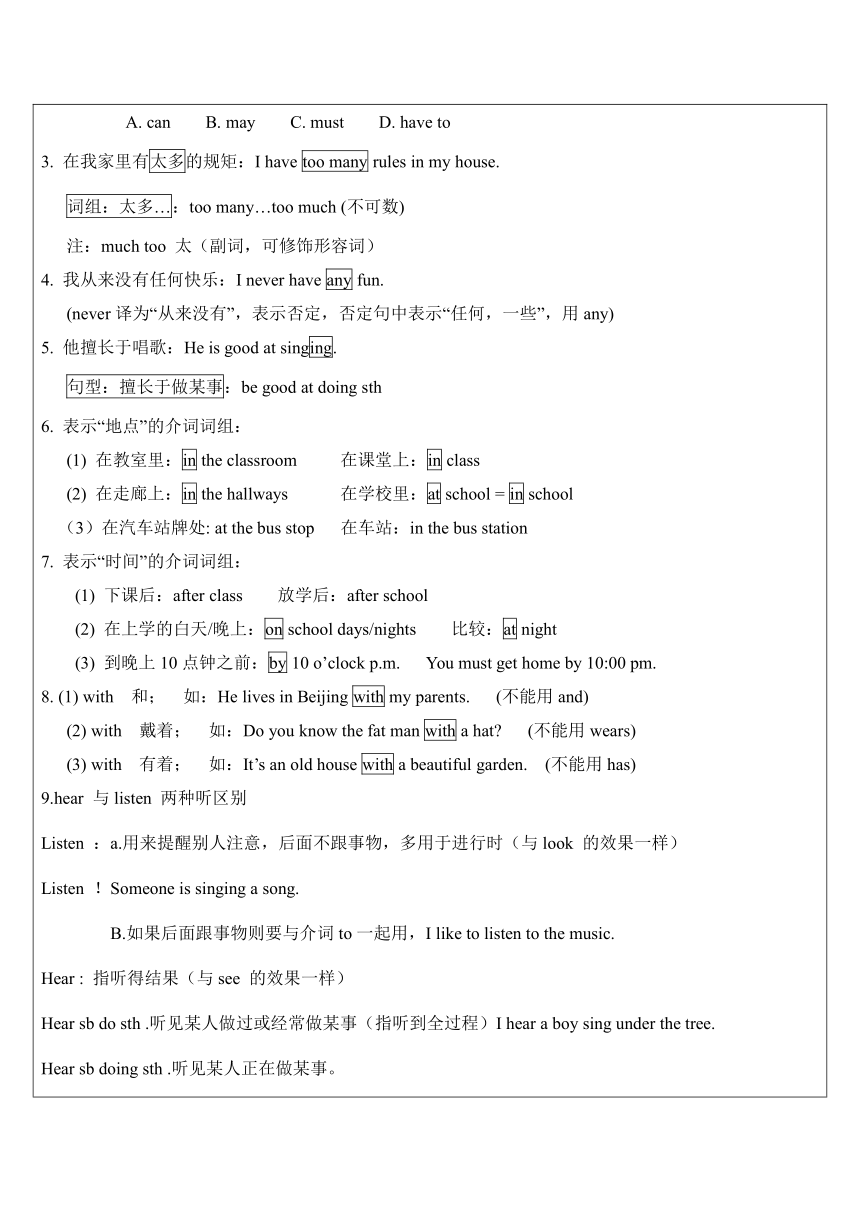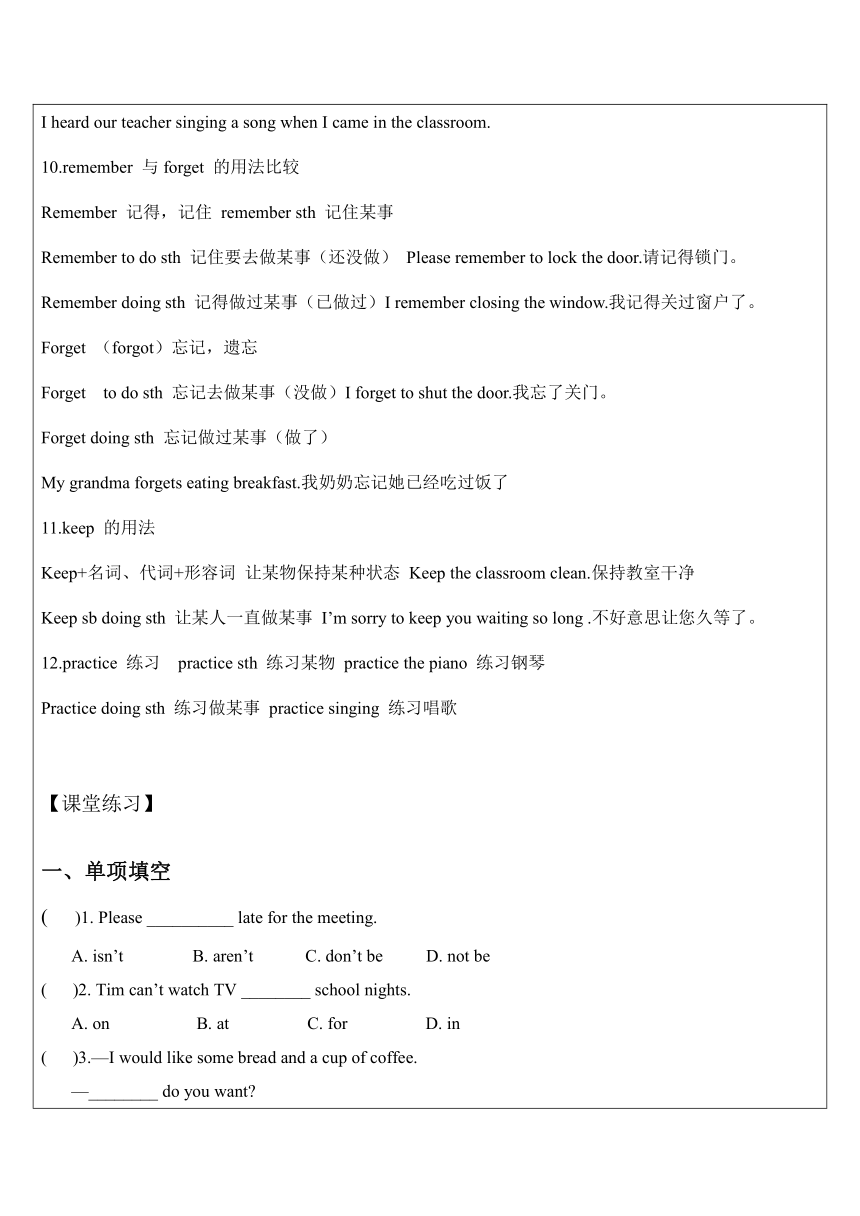Unit 4 Don't eat in class同步复习教案+练习(含答案)
文档属性
| 名称 | Unit 4 Don't eat in class同步复习教案+练习(含答案) |  | |
| 格式 | zip | ||
| 文件大小 | 25.0KB | ||
| 资源类型 | 教案 | ||
| 版本资源 | 人教新目标(Go for it)版 | ||
| 科目 | 英语 | ||
| 更新时间 | 2022-01-20 08:55:23 | ||
图片预览




文档简介
课题 Unit4:Don’t eat in class.
教学重难点 祈使句的用法和本节词汇
教学目标 掌握祈使句的基本用法; 学会描述各种规矩法则; 3.掌握本单元的基本词汇和语法点。
教学内容
【课堂导入】 问学生上课的时候应该做什么,不应该做什么。 【知识讲授】 基础词汇 rule arrive listen fight sorry outside wear important bring quiet out practice before dirty more noisy relax terrible feel(felt) strict remember follow luck keep learn hair 重点短语 (be) on time 准时 listen to 听... fight with sb 与某人打架 go out 外出 do the dishes 洗碗 make (one’s) bed 铺床 be strict with sb 对某人严格要求 follow the rules 遵守规则 on Tuesday afternoon 在周二下午 be/keep quiet 保持安静 lucky dog 幸运儿 基本句型 祈使句 肯定祈使句 (1) 实义动词原形+其他; (2) be动词原形+形容词+其他; (3) Let sb do sth. 否定的祈使句: (1) Don’t+实义动词+原形; (2) Don’t be+形容词+其他; (3) Don’t let sb do sth (4) No+Ving. 练:(1) My mother said to me, “Tom, _______ in bed.” A. not read B. doesn’t read C. don’t read D. didn’t read (2) Don’t __________ (fight). = No __________ (fight). . 不要迟到:Don’t arrive late. = Don’t be late. (arrive = be) 上课/上学不要迟到:Don’t arrive (be) late for class/school. 主语省略(无主语):Don’t arrive late for class. 主语不省略(有主语):We can’t arrive ;ate for class. After dinner, I can’t relax either. 晚饭后我也不能放松。 Either 表示也的意思,和too 一样,too 用语肯定句中,Nice to meet you too. Either 用于否定句中 I don’t like banana either. 知识点 1.情态动词have to 和must 的区别 have to ,侧重客观的需要,有“不得不,被迫”之意,有多种时态形式,否定式为needn’t意为“不必”或 don’t have to 。 I have to take care my mother at home, she is ill in bed. 妈妈我卧病在床,我不得不在家照顾她。 must侧重于说话者的主观看法,认为有必要或有义务做某事,只有现在时一种形式(永远不会变形),否定式mustn’t意为“一定不要,不允许,禁止I mustn’t go out in the evening when I was young. 2.. 在学校我们必须穿校服:We have to wear uniforms at school. 句型:不得不/必须做某事:have to do sth 否定:不必做某事:don’t have to do sth 穿校服:单数:wear a uniform 复数:wear uniforms 练:(1) – I can’t stop smoking, doctor. – For your health, I’m afraid you ______. A. can B. may C. must D. have to 3. 在我家里有太多的规矩:I have too many rules in my house. 词组:太多…:too many…too much (不可数) 注:much too 太(副词,可修饰形容词) 4. 我从来没有任何快乐:I never have any fun. (never译为“从来没有”,表示否定,否定句中表示“任何,一些”,用any) 5. 他擅长于唱歌:He is good at singing. 句型:擅长于做某事:be good at doing sth 6. 表示“地点”的介词词组: (1) 在教室里:in the classroom 在课堂上:in class (2) 在走廊上:in the hallways 在学校里:at school = in school (3)在汽车站牌处: at the bus stop 在车站:in the bus station 7. 表示“时间”的介词词组: (1) 下课后:after class 放学后:after school (2) 在上学的白天/晚上:on school days/nights 比较:at night (3) 到晚上10点钟之前:by 10 o’clock p.m. You must get home by 10:00 pm. 8. (1) with 和; 如:He lives in Beijing with my parents. (不能用and) (2) with 戴着; 如:Do you know the fat man with a hat (不能用wears) (3) with 有着; 如:It’s an old house with a beautiful garden. (不能用has) 9.hear 与listen 两种听区别 Listen :a.用来提醒别人注意,后面不跟事物,多用于进行时(与look 的效果一样) Listen !Someone is singing a song. B.如果后面跟事物则要与介词to一起用,I like to listen to the music. Hear : 指听得结果(与see 的效果一样) Hear sb do sth .听见某人做过或经常做某事(指听到全过程)I hear a boy sing under the tree. Hear sb doing sth .听见某人正在做某事。 I heard our teacher singing a song when I came in the classroom. remember 与forget 的用法比较 Remember 记得,记住 remember sth 记住某事 Remember to do sth 记住要去做某事(还没做) Please remember to lock the door.请记得锁门。 Remember doing sth 记得做过某事(已做过)I remember closing the window.我记得关过窗户了。 Forget (forgot)忘记,遗忘 Forget to do sth 忘记去做某事(没做)I forget to shut the door.我忘了关门。 Forget doing sth 忘记做过某事(做了) My grandma forgets eating breakfast.我奶奶忘记她已经吃过饭了 keep 的用法 Keep+名词、代词+形容词 让某物保持某种状态 Keep the classroom clean.保持教室干净 Keep sb doing sth 让某人一直做某事 I’m sorry to keep you waiting so long .不好意思让您久等了。 practice 练习 practice sth 练习某物 practice the piano 练习钢琴 Practice doing sth 练习做某事 practice singing 练习唱歌 【课堂练习】 单项填空 ( )1. Please __________ late for the meeting. A. isn’t B. aren’t C. don’t be D. not be ( )2. Tim can’t watch TV ________ school nights. A. on B. at C. for D. in ( )3.—I would like some bread and a cup of coffee. —________ do you want A. What other B. What others C. What else D. What the other ( )4. Don’t forget________ me this evening. A. to call B. call C. calls D. calling ( )5. Linda ________school at 7:30 in the morning. A. gets B. arrives C. gets to D. arrives to ( )6. ________wet umbrellas. A. No B. Not C. Don’t D. Aren’t ( )7. Don’t be ______, please. The baby is sleeping. A. noise B. quiet C. noisy D. dirty ( )8. It’s not good to arrive late _________ school. A. to B. for C. with D. of ( )9. —_______ your friend like —He’s smart and a little shy. A. What does B. What is C. What are D. How does ( )10. Students have to wear _________ on school days. A. glasses B. school uniforms C. watches D. earrings 根据汉语提示完成句子 1. 我也不能玩电子游戏。 I can’t _______ computer games, ________. 2. 我们通常在餐厅里吃饭。 We usually eat in the ________ ________. 3. Lily不得不打扫她的卧室。 Lily ________ _________ _________ her bedroom. 4. 我爸爸经常帮我妈妈做晚饭。 My father often helps my mother _________ __________. 5. 不要上课迟到。 __________ __________ _________ for class. 6. 他经常和他的表弟打架。 He often _________ with his _________. 按要求完成句子 1. I have to clean the classroom.(改为一般疑问句) _________ you _________ _________ clean the classroom 2. We can listen to music in the music room.(改为一般疑问句并作肯定回答) —_________ you _________ _________ music in the music room —Yes, we _________. 3. We have to wear a uniform.(改为否定句) We _________ _________ _________ wear a uniform. 4. Don’t be late for school.(改为同义句) Please be _________ _________ for school. 5. We can’t run in the hallways.(改为祈使句) _________ _________ in the hallways. 【课后作业】 四、阅读理解 Dear Dave, I’m not happy. There are too many rules in my house. It isn’t fair. I have to get up at five o’clock every morning. I can’t arrive late for school. I have to be there at eight o’clock. I have to come back home after school because I have to do my homework. In the evening I can’t watch TV because I have to help my mother make dinner and wash the dishes. I have to go to bed before ten o’clock. On weekends, I have to stay at home on Saturday morning. I have to clean my room and wash my clothes by eleven o’clock. On Saturday afternoon, I have to go to the children’s palace to learn the piano. Do you have lots of rules Are they fair Your friend, Alice ( )1. Who is the letter from A. Dave. B. Alice. C. Dave’s mother. D. Alice’s mother. ( )2. What time does Alice have to get up A. Five o’clock. B. Eight o’clock. C. Ten o’clock. D. Eleven o’clock. ( )3. What does Alice have to do on Saturday morning A. Wash the dishes. B. Watch TV. C. Wash her clothes. D. Learn the piano. ( )4. Why does she go to the children’s palace A. To meet friends. B. To learn math. C. To learn piano. D. To play football. ( )5. Why is Alice not so happy A. Because she isn’t feeling well. B. Because she has nothing to do on weekends. C. Because there are so many rules in her school. D. Because there are so many rules in her house. 答案 一、1-5 CACAC 6-10 ACBBB 二、1. play; either 2. dining hall 3. has to clean 4. cook dinner 5. Don’t be late 6. fights; cousin 三、1. Do; have to 2. Can; listen to; can 3. don’t have to 4. on time 5. Don’t run 四、1-5 BACCD
教学重难点 祈使句的用法和本节词汇
教学目标 掌握祈使句的基本用法; 学会描述各种规矩法则; 3.掌握本单元的基本词汇和语法点。
教学内容
【课堂导入】 问学生上课的时候应该做什么,不应该做什么。 【知识讲授】 基础词汇 rule arrive listen fight sorry outside wear important bring quiet out practice before dirty more noisy relax terrible feel(felt) strict remember follow luck keep learn hair 重点短语 (be) on time 准时 listen to 听... fight with sb 与某人打架 go out 外出 do the dishes 洗碗 make (one’s) bed 铺床 be strict with sb 对某人严格要求 follow the rules 遵守规则 on Tuesday afternoon 在周二下午 be/keep quiet 保持安静 lucky dog 幸运儿 基本句型 祈使句 肯定祈使句 (1) 实义动词原形+其他; (2) be动词原形+形容词+其他; (3) Let sb do sth. 否定的祈使句: (1) Don’t+实义动词+原形; (2) Don’t be+形容词+其他; (3) Don’t let sb do sth (4) No+Ving. 练:(1) My mother said to me, “Tom, _______ in bed.” A. not read B. doesn’t read C. don’t read D. didn’t read (2) Don’t __________ (fight). = No __________ (fight). . 不要迟到:Don’t arrive late. = Don’t be late. (arrive = be) 上课/上学不要迟到:Don’t arrive (be) late for class/school. 主语省略(无主语):Don’t arrive late for class. 主语不省略(有主语):We can’t arrive ;ate for class. After dinner, I can’t relax either. 晚饭后我也不能放松。 Either 表示也的意思,和too 一样,too 用语肯定句中,Nice to meet you too. Either 用于否定句中 I don’t like banana either. 知识点 1.情态动词have to 和must 的区别 have to ,侧重客观的需要,有“不得不,被迫”之意,有多种时态形式,否定式为needn’t意为“不必”或 don’t have to 。 I have to take care my mother at home, she is ill in bed. 妈妈我卧病在床,我不得不在家照顾她。 must侧重于说话者的主观看法,认为有必要或有义务做某事,只有现在时一种形式(永远不会变形),否定式mustn’t意为“一定不要,不允许,禁止I mustn’t go out in the evening when I was young. 2.. 在学校我们必须穿校服:We have to wear uniforms at school. 句型:不得不/必须做某事:have to do sth 否定:不必做某事:don’t have to do sth 穿校服:单数:wear a uniform 复数:wear uniforms 练:(1) – I can’t stop smoking, doctor. – For your health, I’m afraid you ______. A. can B. may C. must D. have to 3. 在我家里有太多的规矩:I have too many rules in my house. 词组:太多…:too many…too much (不可数) 注:much too 太(副词,可修饰形容词) 4. 我从来没有任何快乐:I never have any fun. (never译为“从来没有”,表示否定,否定句中表示“任何,一些”,用any) 5. 他擅长于唱歌:He is good at singing. 句型:擅长于做某事:be good at doing sth 6. 表示“地点”的介词词组: (1) 在教室里:in the classroom 在课堂上:in class (2) 在走廊上:in the hallways 在学校里:at school = in school (3)在汽车站牌处: at the bus stop 在车站:in the bus station 7. 表示“时间”的介词词组: (1) 下课后:after class 放学后:after school (2) 在上学的白天/晚上:on school days/nights 比较:at night (3) 到晚上10点钟之前:by 10 o’clock p.m. You must get home by 10:00 pm. 8. (1) with 和; 如:He lives in Beijing with my parents. (不能用and) (2) with 戴着; 如:Do you know the fat man with a hat (不能用wears) (3) with 有着; 如:It’s an old house with a beautiful garden. (不能用has) 9.hear 与listen 两种听区别 Listen :a.用来提醒别人注意,后面不跟事物,多用于进行时(与look 的效果一样) Listen !Someone is singing a song. B.如果后面跟事物则要与介词to一起用,I like to listen to the music. Hear : 指听得结果(与see 的效果一样) Hear sb do sth .听见某人做过或经常做某事(指听到全过程)I hear a boy sing under the tree. Hear sb doing sth .听见某人正在做某事。 I heard our teacher singing a song when I came in the classroom. remember 与forget 的用法比较 Remember 记得,记住 remember sth 记住某事 Remember to do sth 记住要去做某事(还没做) Please remember to lock the door.请记得锁门。 Remember doing sth 记得做过某事(已做过)I remember closing the window.我记得关过窗户了。 Forget (forgot)忘记,遗忘 Forget to do sth 忘记去做某事(没做)I forget to shut the door.我忘了关门。 Forget doing sth 忘记做过某事(做了) My grandma forgets eating breakfast.我奶奶忘记她已经吃过饭了 keep 的用法 Keep+名词、代词+形容词 让某物保持某种状态 Keep the classroom clean.保持教室干净 Keep sb doing sth 让某人一直做某事 I’m sorry to keep you waiting so long .不好意思让您久等了。 practice 练习 practice sth 练习某物 practice the piano 练习钢琴 Practice doing sth 练习做某事 practice singing 练习唱歌 【课堂练习】 单项填空 ( )1. Please __________ late for the meeting. A. isn’t B. aren’t C. don’t be D. not be ( )2. Tim can’t watch TV ________ school nights. A. on B. at C. for D. in ( )3.—I would like some bread and a cup of coffee. —________ do you want A. What other B. What others C. What else D. What the other ( )4. Don’t forget________ me this evening. A. to call B. call C. calls D. calling ( )5. Linda ________school at 7:30 in the morning. A. gets B. arrives C. gets to D. arrives to ( )6. ________wet umbrellas. A. No B. Not C. Don’t D. Aren’t ( )7. Don’t be ______, please. The baby is sleeping. A. noise B. quiet C. noisy D. dirty ( )8. It’s not good to arrive late _________ school. A. to B. for C. with D. of ( )9. —_______ your friend like —He’s smart and a little shy. A. What does B. What is C. What are D. How does ( )10. Students have to wear _________ on school days. A. glasses B. school uniforms C. watches D. earrings 根据汉语提示完成句子 1. 我也不能玩电子游戏。 I can’t _______ computer games, ________. 2. 我们通常在餐厅里吃饭。 We usually eat in the ________ ________. 3. Lily不得不打扫她的卧室。 Lily ________ _________ _________ her bedroom. 4. 我爸爸经常帮我妈妈做晚饭。 My father often helps my mother _________ __________. 5. 不要上课迟到。 __________ __________ _________ for class. 6. 他经常和他的表弟打架。 He often _________ with his _________. 按要求完成句子 1. I have to clean the classroom.(改为一般疑问句) _________ you _________ _________ clean the classroom 2. We can listen to music in the music room.(改为一般疑问句并作肯定回答) —_________ you _________ _________ music in the music room —Yes, we _________. 3. We have to wear a uniform.(改为否定句) We _________ _________ _________ wear a uniform. 4. Don’t be late for school.(改为同义句) Please be _________ _________ for school. 5. We can’t run in the hallways.(改为祈使句) _________ _________ in the hallways. 【课后作业】 四、阅读理解 Dear Dave, I’m not happy. There are too many rules in my house. It isn’t fair. I have to get up at five o’clock every morning. I can’t arrive late for school. I have to be there at eight o’clock. I have to come back home after school because I have to do my homework. In the evening I can’t watch TV because I have to help my mother make dinner and wash the dishes. I have to go to bed before ten o’clock. On weekends, I have to stay at home on Saturday morning. I have to clean my room and wash my clothes by eleven o’clock. On Saturday afternoon, I have to go to the children’s palace to learn the piano. Do you have lots of rules Are they fair Your friend, Alice ( )1. Who is the letter from A. Dave. B. Alice. C. Dave’s mother. D. Alice’s mother. ( )2. What time does Alice have to get up A. Five o’clock. B. Eight o’clock. C. Ten o’clock. D. Eleven o’clock. ( )3. What does Alice have to do on Saturday morning A. Wash the dishes. B. Watch TV. C. Wash her clothes. D. Learn the piano. ( )4. Why does she go to the children’s palace A. To meet friends. B. To learn math. C. To learn piano. D. To play football. ( )5. Why is Alice not so happy A. Because she isn’t feeling well. B. Because she has nothing to do on weekends. C. Because there are so many rules in her school. D. Because there are so many rules in her house. 答案 一、1-5 CACAC 6-10 ACBBB 二、1. play; either 2. dining hall 3. has to clean 4. cook dinner 5. Don’t be late 6. fights; cousin 三、1. Do; have to 2. Can; listen to; can 3. don’t have to 4. on time 5. Don’t run 四、1-5 BACCD
同课章节目录
- Unit 1 Can you play the guitar?
- Section A
- Section B
- Unit 2 What time do you go to school?
- Section A
- Section B
- Unit 3 How do you get to school?
- Section A
- Section B
- Unit 4 Don't eat in class.
- Section A
- Section B
- Unit 5 Why do you like pandas?
- Section A
- Section B
- Unit 6 I'm watching TV.
- Section A
- Section B
- Review of Units 1-6
- Unit 7 It's raining!
- Section A
- Section B
- Unit 8 Is there a post office near here?
- Section A
- Section B
- Unit 9 What does he look like?
- Section A
- Section B
- Unit 10 I'd like some noodles.
- Section A
- Section B
- Unit 11 How was your school trip?
- Section A
- Section B
- Unit 12 What did you do last weekend?
- Section A
- Section B
